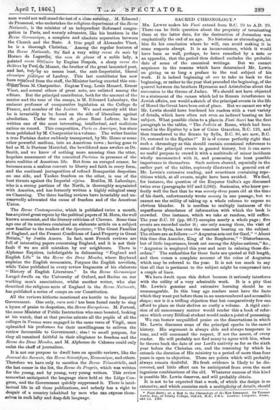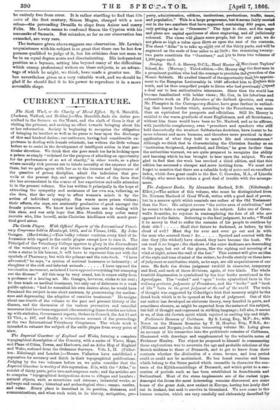SACRED CHRONOLOGY.*
MR. LEWIN makes his Fasti extend from B.C. 70 to A.D. 70.
There can be little question about the propriety of terminating them at the latter date, for the destruction of Jerusalem was emphatically the end of an age. No historian or chronologist, let him fix his conclusion where he will, can avoid making it in some respects abrupt. It is an inconvenience, which it would have been as well, perhaps, to have remedied by a note or an appendix, that the period thus defined excludes the probable date of some of the canonical writings. But we cannot acquiesce in the reasons which have determined Mr. Lewin on giving us so long a preface to the real subject of his work. It is indeed beginning ab ovo to take us back to the beginning, or rather to the year that preceded the beginning, of the quarrel between the brothers Hyrcanus and Aristobulus about the succession to the throne of Judrea. We should not have objected to a statement of the causes which led to Roman interference in Jewish affairs, nor would a sketch of the principal events in the life of Herod the Great have been out of place. But we cannot see why Mr. Lewin should have burdened his readers with a vast variety of details, which have often not even an indirect bearing on his subject. What possible claim to a place in Fasti Sacri has the first paragraph in the tables, "The Judicia at Rome, which had been vested in the Equites by a law of Caius Gracchus, B.C. 123, and then transferred to the Senate by Sylla, B.C. 80, are now, B.C. 70, restored to the Equites?" It is of course perfectly right that such a chronology as this should contain occasional references to some of the principal events in general history, but it can serve no useful purpose to crowd it with a multitude of minor incidents wholly unconnected with it, and possessing the least possible importance in themselves. Such notices abound, especially in the earlier part of the tables, copiously illustrated in general out of Mr. Lewin's extensive reading, and sometimes containing repe- titions which, at all events, might have been avoided. We find, for instance, the question of the Emperor Galba's age discussed twice over (paragraphs 957 and 2,082). Suetonius, who knew per- fectly well the fact that he was seventy-three years old at the time of his death, unfortunately wrote seventy in one passage, but we cannot see the utility of taking up a whole column to expose an obvious blunder. It is needless to multiply instances of the superfluous abundance of information with which the book is crowded. One instance, which we take at random, will suffice. The year B.C. 16 (pp. 96-7) occupies nearly a whole page ; fire events are recorded under it ; one only among them, the visit of Agrippa to Syria, has even the remotest bearing on the subject. The others are as follows :—" Augustus seta out for Gaul," "About this time dies Asunder, King of the Bosphorus," "Disturbances, but of little importance, break out among the Alpine nations," &c., "Augustus is employed this year and next in calming those dis- orders." The authorities for these facts are quoted at full length, and then comes a complete account of the coins of Augustus which may be referred to the year. It is not too much to say that all that is pertinent to the subject might be compressed into a couple of lines.
We have dwelt upon this defect because it seriously interferes with the utility of a very admirable work. It is a pity that Mr. Lewin's genuine and extensive learning should be so unmanageable. In this busy age readers must have the facts which they want put before them in an unencumbered and accessible shape; nor is it a trifling objection that but comparatively few can afford to place on their shelves so costly a volume. A rigid exci- sion of all unnecessary matter would render this a book of refer- ence which every Biblical student would make a point of possessing.
We can bestow unqualified praise on the dissertations in which Mr. Lewin discusses some of the principal epochs in the sacred history. His argument is always able and always temperate in tone, and will command the respect, if not the assent, of every reader. He will probably not find many to agree with him, when he throws back the date of our Lord's nativity as far as the sixth year before the Christian era, and the reasoning by which he extends the duration of His ministry to a period of more than four years is open to objection. These are points which will probably always remain doubtful. No fresh evidence is likely to be dis- covered, and little effect can be anticipated from even the most ingenious combinations of the old. Whatever success of this kind is possible Mr. Lewin deserves, and will probably obtain.
It is not to be expected that a work, of which the design is so extensive, and which contains such a multiplicity of details, should
* Fasti Seen; or, a Rey to the Chronology of thi New Testament,. By Thomas Lewin, Esq., of Trinity College, Oxford, MA., F.B.A. London: Longman, Green. and Co. 1685.
be entirely free from error. It is rather startling to find that brte noire of the first century, Simon Magus, charged with a new crime—gthe persuading Druglla to elope from Azizus and marry li'errx. Mr. Lewin seems to confound Simon the Cyprian with his namesahe of Samaria. But mistakes, as far as our observation has extended, are very rare.
The instance given above suggests one observation. Mr. Lewin's acquaintance with his subject is so great that there can be but few persons qualified to judge of it, but his criticism does not seem to be in an equal degree acute and discriminating. His independent position as a layman, setting him beyond many of the difficulties which cramp professional writers on these subjects, is an advan- tage of which he might, we think, have made a greater use. He has nevertheless given us a very valuable work, and we should be glad if be should find it in his power to reproduce it in a more accessible shape.































 Previous page
Previous page